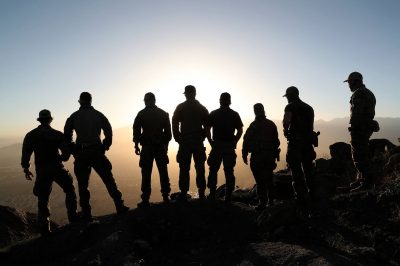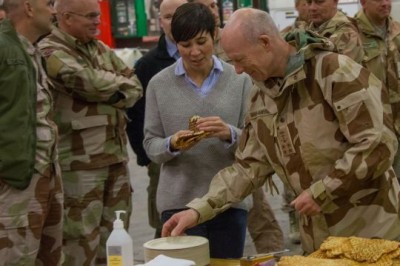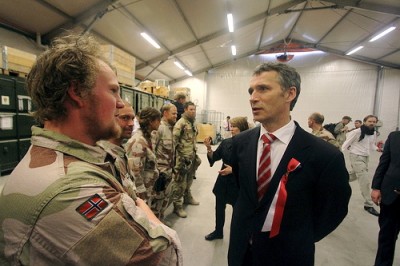NEWS ANALYSIS: As more flights land in Oslo with evacuees from Afghanistan, there’s no end to the soul-searching over Norway’s involvement in the war-torn country over the past 20 years. Calls have gone out for a new evaluation of the Afghan mission, even after a Norwegian government-appointed commission concluded five years ago that Norway didn’t achieve much more than being a good ally for NATO and the US.

Another 69 evacuees from Kabul, including Norwegian, Afghan and “other” foreign citizens landed on Sunday, following a flight on Friday with less than 40 people. A third flight landed early Monday morning, on which some of the new arrivals were infants and toddlers. They’d been handed over barbed-wire fences at the Kabul airport to NATO troops by terrified Afghan parents, desperate to get at least their child out of the country after it was taken over last week by Taliban forces with a long history of brutality.
Norway’s foreign ministry wouldn’t immediately say how many were on board the military aircraft landing on Monday, claiming that “detailed information” about the passengers was being withheld “out of consideration for their need for protection and security.” The babies will be taken care of by Norwegian child welfare services.
Foreign Minister Ine Eriksen Søreide had said on Sunday that among those on the second flight were “Norwegian citizens, our own locally employed Afghans with their families and other countries’ citizens.” She wrote in an email to newspaper Klassekampen on Sunday that it “was a great relief for us that locally employed Afghans and their families have now now been evacuated from Kabul.”
She noted that many of those on board “have worked with us and taken care of Norwegian interests” in Afghanistan. “They have been subjected to tremendous strain during the evacuation, which was both difficult and time-consuming,” she said. Now they will be able to apply for asylum in Norway.
Still too few getting out
Once again, though, the numbers of people flown out by the Norwegians have been small, with tens of thousands of others still in Afghanistan and clamouring to escape the Taliban’s renewed rule over the country. The problem is the continued chaos around the airport in Kabul, where thousands have surrounded its perimeter in an effort to get on a flight. That’s resulted in horrific humanitarian conditions, with people also being injured or even trampled to death. Norwegian authorities, like those of many other NATO countries including the US, are now asking Norwegian citizens to stay away from the airport area until they have confirmation that they can gain entry and get a seat on a flight. Norwegian diplomats were evacuated last week and Norway’s embassy has been closed, at least temporarily.
“The intense work to help Norwegian citizens who want to travel home to Norway continues,” Søreide insisted. “It’s a huge and demanding round-the-clock operation.” She noted that the masses of people assembled around the airport “make it difficult and dangerous to move towards the military portion of the airport,” which is the only area where flights are operating.

As what Søreide called the “chaos and uncertainty” continued, debate has been flying in Norway over what many see as the country’s “moral obligation” to help evacuate and offer asylum to hundreds if not thousands more Afghans who helped Norwegian forces over the years or were trained by Norwegians to defend the country, only to see it fall to the Taliban. Norwegian Defense Chief General Eirik Kristoffersen told newspaper Aftenposten over the weekend that he and his colleagues were receiving unconfirmed reports that some leaders of NATO-trained Afghan security forces are being singled out and executed by Taliban forces. “At the same time, we’re hearing that some (Afghan) soldiers have laid down their weapons, gone home and that it’s peaceful around them.”
Kristoffersen told Aftenposten that many Norwegian veterans of service in Afghanistan have stayed in touch with those they trained and with their interpreters. They feel strongly, as do other high-ranking Norwegian military personnel and former defense officials, that Norway must not “betray” their former colleagues in Afghanistan. News bureau NTB reported last week how 13 Afghans who worked for Norwegian forces have sent pleas for help in getting out of Afghanistan, fearing they’ll be captured and tortured or killed by the Taliban. They’ve sent emails with copies of their ID-cards and Norwegian work contracts, but complain there’s been no response. Kristoffersen himself is skeptical that the Taliban has really changed its brutal ways: “Personally, I feel a sense of horror when I see photos of smiling Taliban leaders who say they will treat people well and respect human rights, because it remains to be seen whether they’ll do what they say.”
Norway, like other NATO allies, responded to the US’ call for help in preventing Afghanistan from nurturing terrorist organizations. The call came right after the terrorist attacks on the US in September 2001. NATO quickly enacted its policy that an attack on one NATO member was an attack on all, and the NATO troops were sent to Afghanistan.
Most experts agree that the Taliban was then forced out of positions of power in Afghanistan and terrorist organizations like Al-Qaeda were forced out too. Ten years later the US liquidated the leader of the attacks in 2011, Osama bin Laden, but NATO troops remained in Afghanistan for various missions to improve women’s rights, ensure schooling for both boys and girls, and carry on what many viewed as nation-building and stabilization efforts. Now US President Joe Biden claims there never was a “nation-building” mission in Afghanistan, confusing many Norwegian political and military officials who thought that’s what they were supposed to be doing there. Norway reportedly has spent more than NOK 10 billion on operations in the country and has had 9,200 troops stationed in Afghanistan (10 of whom were killed) since 2001.

In 2016, the current Conservative government coalition now up for re-election received a report on Norway’s participation with NATO in Afghanistan. Already then, its leader and former Foreign Minister Bjørn Tore Godal concluded that only one real goal was met: Norway showed itself to be “a good ally” for the US (even though the Bush Administration was disappointed that Norway refused to join in on the US’ subsequent invasion of Iraq). The Godal Commission concluded that Norway’s other goals of fighting terrorism, development and stabilization of Afghanistan were not met. Various Norwegian newspapers have editorialized during the past week that the rapid fall of the Afghan government and the Taliban’s ultimate victory only strengthen that conclusion.
Now Norway’s Socialist Left Party (SV), which looks likely to be part of a new left-center government coalition after next month’s election, is calling for a new examination and discussion of Norway’s participation in US/NATO-led military operations. SV, which has long opposed Norway’s membership in NATO, has also pointed to the current chaos in Libya after Norway actively took part in the bombing that toppled its regime at the same time Norway had troops in Aghanistan.
Even the Labour Party, which wants SV to part of a prospective new government, wants a public discussion about whether things could have been done differently. That’s significant, because former Labour Party leader Jens Stoltenberg, Norway’s prime minister from 2005-2013, actively support both the Afghanistan and Libya involvement. His support is widely believed to have propelled him into his current job as NATO secretary general since 2014.
‘Fundamental discussion needed’
“What’s happened in Afghanistan must lead to a fundamental discussion about the use of military power abroad and our participation in US-led operations,” Kari Elisabeth Kaski, a Member of Parliament for SV, told newspaper Dagsavisen last week. “We have known for a long time that the central goals for the war in Afghanistan were not achieved. That’s crushing, after 20 years of contributions.”
Kaski doesn’t think all of it was in vain, adding that “it’s now more important than ever that we support those still fighting for basic human rights in Afghanistan.” But for “all those who eagerly support the military operation, its complete collapse must be a wake-up call.”
Anniken Huitfeldt, a Member of Parliament for Labour and leader of its foreign relations committee, also thinks the Norwegian government and Parliament needs to at least question whether things could have been done differently. “We have succeeded in fighting against international terrorism, and Afghanistan is no longer a base for international terrorists,” Huitfeldt said, “but we failed in building up a democracy. We must continue that discussion also after the Godal Commission’s report.”
MP Michael Tetzshchner, a veteran of the Conservative Party, called the Taliban’s victory in Afghanistan “a huge setback, and the question is whether it will lead to catastrophe for the Afghan people. We must concede that Afghanistan’s authorities didn’t manage to create the legitimacy needed within their own people. Then all the foreign aid in the world won’t help build a civil society.”
Huitfeldt and Kaski are much more open towards offering asylum in Norway to those who worked for Norwegian troops. Huitfeldt noted, however, that there are “large economic differences among Afghan refugees,” and only those with real needs for protection should have priority, not those with the resources to get out of the country themselves.
newsinenglish.no/Nina Berglund

